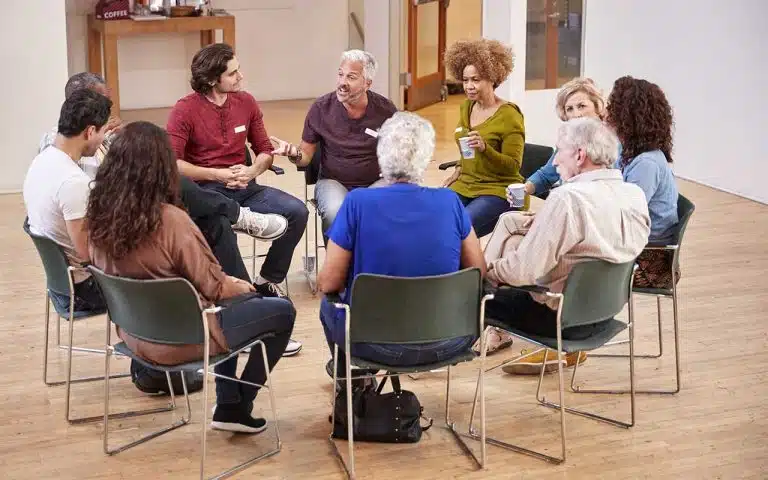Group Therapy In Addiction Treatment

Therapy is an essential part of addiction treatment. When you think of therapy, you probably imagine someone talking to a mental health professional one-on-one, which is called individual therapy.
While individual therapy is important, most people who struggle with addiction also benefit from group therapy.
What Is Group Therapy?
Group psychotherapy is a type of therapy that involves a therapist and at least two people who are seeking treatment. The number of group members can vary, though it’s usually between 5 and 10. Larger groups may be led by more than one therapist.
During a group therapy session, the therapist leads the group in discussion. Some groups discuss all aspects of substance abuse recovery, while others focus on a specific topic, such as:
- relationship skills
- mindfulness (the ability to live in the present moment)
- anger management
- healing from trauma
- dealing with triggers (people, places, feelings, or situations that make you want to abuse drugs)
How Group Therapy Works
No matter the topic, the group therapist will ask questions, encourage each member to share their experiences and thoughts, provide feedback when necessary, and establish guidelines to maintain a healthy, supportive environment.
Most sessions last one to two hours. In an inpatient setting, groups often meet daily or a few times a week. In an outpatient setting, they usually meet once or twice a week.
Some groups are open, which means new members can join at any time, while others are closed, which means new members can’t join. Closed groups usually last a specific number of weeks or months. Open groups may last indefinitely.
Types Of Group Therapy
Many treatment centers offer multiple types of group therapy. The most common types include:
Psychoeducational Groups
These groups educate members about addiction, recovery, relapse prevention, and other important topics. The therapist prompts members to think about the topics in relation to their own experiences.
Cognitive-Behavioral/Problem-Solving Groups
These groups help members manage unhealthy thoughts and behaviors that contribute to drug abuse. They also teach helpful coping skills, such as meditation, exercise, and journaling.
Skills Development Groups
These groups teach essential skills for a successful recovery, such as:
- social skills to help you repair damaged relationships and connect with new friends who don’t abuse drugs
- drug refusal skills to help you stay sober in situations where you might be offered drugs
- parenting skills to help you take better care of your family as you recover
- money management skills to help you achieve and maintain financial stability as you recover
Interpersonal Process Groups
These groups let members discuss their problems and receive feedback from peers. The discussions can strengthen each member’s communication skills and prepare them for interactions with friends and family after treatment.
Support Groups
These groups help members deal with daily challenges during recovery. They offer emotional support and accountability. In some cases, support groups are led by members of the group instead of therapists.
Benefits Of Group Therapy
Regardless of type, group therapy provides a number of advantages, including:
Peer Support
Although individual therapy offers great insight, you might wonder whether your therapist truly knows what it’s like to live with addiction.
In group therapy, you’ll get feedback and advice from a group of people who’ve faced similar problems. This peer support can help you better understand your own addiction and develop coping skills that really work.
Improved Communication
Group therapy lets you strengthen your socialization skills in a safe, supportive environment. In many ways, the group setting serves as practice for real-world social situations outside treatment.
That means group members can identify personal communication challenges, such as defensiveness or passive-aggression, while a skilled therapist guides them in a healthier direction.
Sense Of Belonging (Universality)
In the midst of addiction, many people abandon their friends and family. They spend all their time with others who regularly abuse drugs. Once they decide to recover, they must end these relationships, causing loneliness and isolation.
In group therapy, you can connect with people who are on the same path to recovery. You’ll develop a sense of belonging that improves your self-esteem and, in some cases, build friendships that last long after treatment ends.
New Perspectives
When you face addiction alone, it’s normal to view your situation in only one way. In group therapy, you’ll hear a variety of experiences, challenges, and coping skills. These unique stories can give you new ideas for dealing with your own addiction.
Increased Hope
While group therapy members are encouraged to discuss their struggles, they also celebrate their successes. Witnessing other people’s victories can enhance your optimism about your own recovery.
To learn more about group therapy and other substance abuse treatment options, please reach out to an Ark Behavioral Health specialist today.
Written by Ark Behavioral Health Editorial Team
©2024 Ark National Holdings, LLC. | All Rights Reserved.
This page does not provide medical advice.
National Center for Biotechnology Information - 2 Types of Groups Commonly Used in Substance Abuse Treatment
National Institute on Drug Abuse - Types of Treatment Programs
Substance Abuse and Mental Health Services Administration - Substance Abuse Treatment: Group Therapy


Questions About Treatment?
Ark Behavioral Health offers 100% confidential substance abuse assessment and treatment placement tailored to your individual needs. Achieve long-term recovery.
100% confidential. We respect your privacy.
Prefer Texting?
Our friendly support team is here to chat 24/7. Opt out any time.







 Learn More
Learn More








